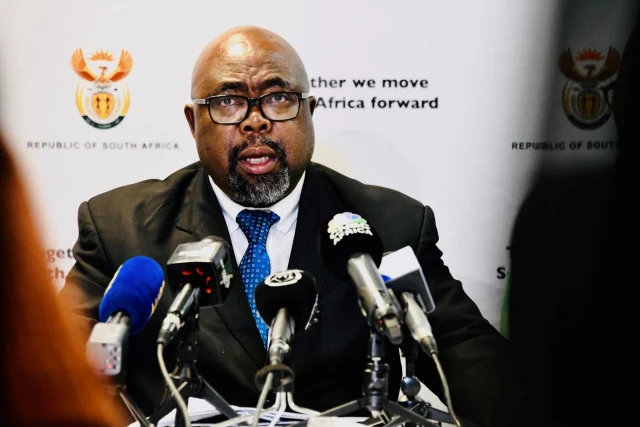DESPITE the prevailing difficult fiscal position, the government believes the 3% salary increase offered to public servants is “generous”.
This is the view of the acting minister of Public Service and Administration (DPSA), Thulas Nxesi and finance minister, Enoch Godongwana.
This as a deadlock persists in wage negotiations with labour unions.
The ministers said the current round of negotiations commenced with the government.
Government, they said, is grappling with a “balancing act” between wage increases and additional headcounts, saying “there’s always competition” between the two.
“Higher than inflationary or unaffordable adjustments on the salaries of the current public servants would mean that there’ll be less money available to increase headcounts in critical frontline services.
“The State capacity in Education, Police and Health has not been increasing in line with the growing population over the years, while wages have increased by an average of 2% above CPI between 2008/09 and 2019/20.”
As an example, the ministers said, the average number of learners per teacher in public ordinary schools decreased from a ratio of 32.3 in 2015/16 to 31.4 in 2021/22, while the number of police officers per 100 000 population decreased from 260 to 236 during the same period.
The number of nurses per 100,000 uninsured population also decreased in this period.
“It is for this reason that additional allocations amounting to approximately R50 billion over the 2022 MTEF were made available to Education, Police and Health to address the wage bill spending and service load pressures.
“Therefore, it becomes imperative that the current and future wage agreements strive to strike a balance between remuneration increases and the need for additional headcounts in frontline services in order to keep up with the increasing demand for public services.”
Labour union demands
Initially, unions demanded a 10% across-the-board increase for this financial year. If acceded to, it would have cost government around R49 billion.
The ministers said the government proposes that employees continue to be paid a non-pensionable cash gratuity, an average of R1 000 after tax to all employees across salary levels 1-12.
“This amounts to an average of 4.5% of the R20.5bn allocated for salaries in the 2022/23 compensation budget. Organised labour rejected this offer.
“After the government presented its revised offer on the baseline, labour then demanded the continuation of the cash gratuity, which amounted to an average of 4.5% on average for all employees, with an additional baseline increase. This is a shift by organised labour from the original position of a baseline increase only.”
In response, the government presented an improved offer of a non-pensionable cash gratuity of an average of R1 000 per month after tax, being an average of 4.5% plus an additional 1.5% on the baseline.
“At this point, labour revised their demand from 10% to 8% on the baseline, plus the continuation of the non-pensionable cash gratuity,” the ministers said.
Employer’s revised offer
Government presented a revised and improved offer on the baseline to 2% plus the non-pensionable cash gratuity, amounting to an average of 4.5% of the R20.5 billion that is on the budget.
“The 2% amounted to an additional R8.9 billion over and above the budgeted of R20.5 billion, costing the government a total of R29.5 billion. Labour revised their demand to 6.5% across-the-board baseline increase, plus the non-pensionable cash gratuity.
“The employer further indicated that any further increase, above the 2% on the baseline, would require additional funding to be sourced from the Compensation of Employees’ budget, and would require an introduction of cost containment measures in the Public Service,” the ministers said.
Labour rejected the employer’s proposal on cost containment measures that were required to cover an additional 1% to make an offer of 3% on the baseline.
They said although organised labour declared a deadlock over the 2% increase on the baseline and a non-pensionable cash allowance, the government continues to engage labour “in good faith”.
Facilitation process
As part of negotiating in good faith, the ministers said the government proposed a facilitation process as part of deadlock-breaking mechanisms at the end of August.
This process resulted in a Draft Collective Agreement, proposing a 3% baseline increase, plus the continuation of the non-pensionable cash allowance to all employees, payable until 31 March 2023.
Employer’s current and final offer
At this stage, the government’s 7.5% packaged offer on the table is as follows:
- The continuation of the current non-pensionable cash allowance of R1,000 for this financial year across all salary levels; and
- A pensionable increase of 3% across the board.
“This offer is beside the 1.5% pay progression payable to all qualifying employees. Therefore, if the pay progression is added to the total package, the total employer offer amounts to a 9% increase.
“We have continued to ensure that public servants are reasonably cushioned against the rising cost of living without crowding out social expenditure. It is a difficult balancing act. Therefore, the misinformation being peddled by some unions in the media is not only unfortunate but also very opportunistic and disingenuous,” the ministers said.
SA NEWS



